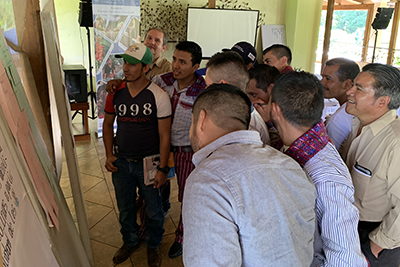The objective of the FTF Guatemala Coffee Value Chains (CVC) Project is to increase agricultural incomes and improve resilience for smallholder farmers and their families in the Western Highlands departments of Huehuetenango, San Marcos and Quiché, while improving nutrition outcomes. This will be achieved through the following three project results: (1) agricultural productivity improved and income generation alternatives diversified; (2) access to markets expanded; and (3) resilience increased through implementation of climate-smart and nutrition sensitive agriculture.
Scope of Work
NCBA CLUSA will participate as a member of the project consortium led by FEDECOCAGUA, which also includes UGK Foundation. NCBA CLUSA’s objectives under this project are working with women and youth on improving nutrition and income generation through the creation of savings and loans groups, and support of poultry production units and home gardens for nutrient-dense crops. NCBA CLUSA also leads gender and social inclusion activities for the project, including providing training and technical assistance to consortium partners and community members on equitable social and gender norms.

Following a workshop designed to address traditional masculinity and its impacts on families and communities, co-op members in Guatemala—largely men—have committed to change at the household level.
Led by the Guatemalan coffee cooperative federation, Fedecocagua, as part of NCBA CLUSA’s Guatemala Coffee Value Chains Project funded by the U.S. Agency for International Development (USAID) through its Feed the Future initiative, the workshop promoted a model for “positive masculinities.”
This model calls on men to recognize how their social and household status (i.e. their roles and responsibilities) drive the unequal distribution of labor in their homes and communities. Workshop participants analyze the negative impacts of traditional masculinity and work to reconstruct models that can bring equity to gender roles.
And it’s not just about achieving more proportional division of labor. Practicing positive masculinities can also curb risk behaviors, support healthier diets for women of childbearing age and lead to more autonomy for women to invest household income in nutritious food and healthcare for themselves and their families.
After the most recent workshop, 164 participants—among them 139 men—pledged to take concrete actions to initiate change at the household level, including participation in reproductive health education, more involvement in domestic work and childcare, supporting women in income-generating activities and promoting a healthy diet for all family members at home.
The event was the latest in a series of workshops informed by the project’s Gender and Social Inclusion Strategy, which builds on NCBA CLUSA’s experience in gender research and programming. Last year, NCBA CLUSA participated in the USAID/Guatemala Gender Analysis and Gender Assessment led by Banyan Global.
Consulting with more than 300 women and men from USAID Guatemala projects, project staff and partners, the Government of Guatemala and civil society organizations, the research explored gender norms and power dynamics within relationships. It also sought to understand project-level gender integration, knowledge, attitudes and practices.

